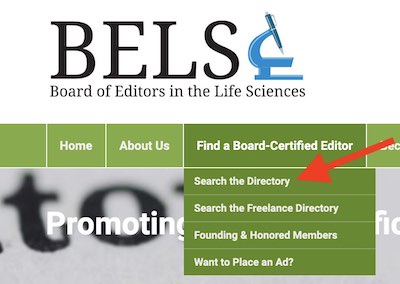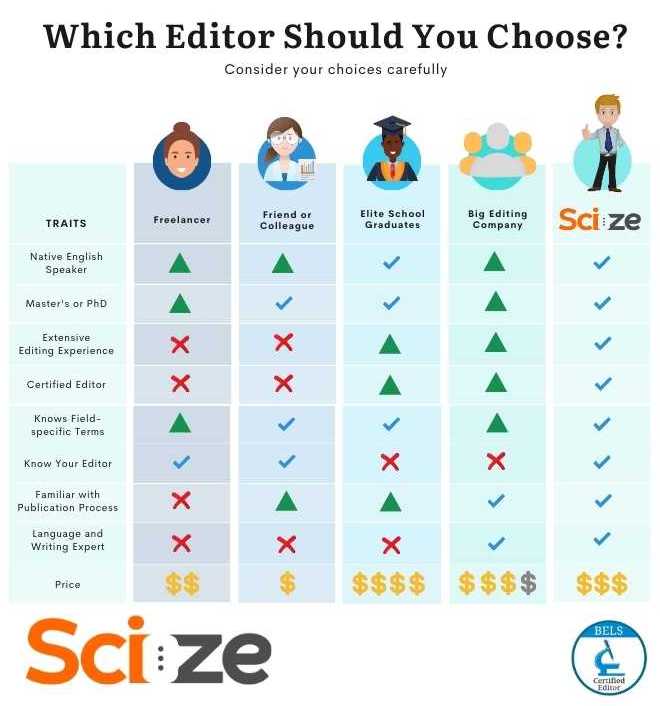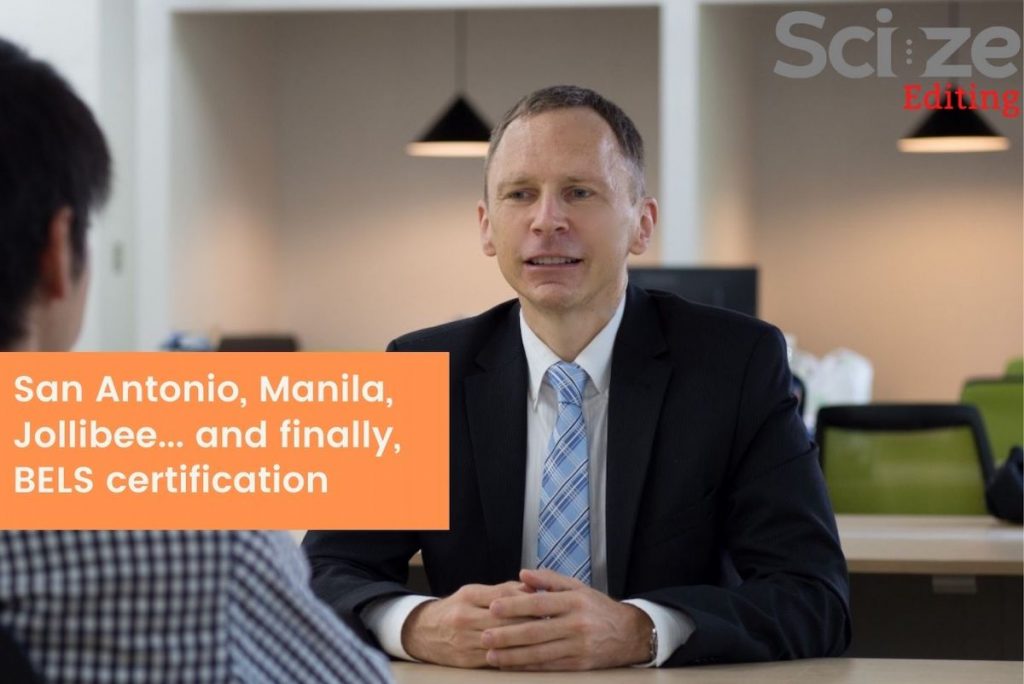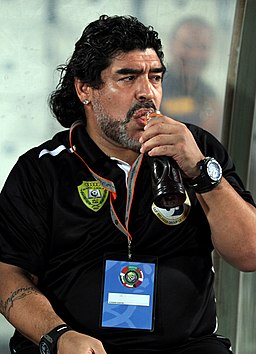Among the various qualifications for copy editors, the ELS qualification signifies a Board-Certified Editor in the Life Sciences. It is granted by the US-based Board of Editors in the Life Sciences (BELS). The ELS letters after an editor’s name are evidence of:
- an editor experienced and proficient in scientific manuscript editing;
- someone an employer can trust to have considerable editing skills in the life sciences (and generally in all STEM and HSS fields); and
- someone who not only knows how to handle the content of a scientific manuscript, but also the ethics and procedures of the publication process.
All these attributes are required to take and pass the ELS exam.
But does an editor need an ELS to be a good scientific editor?
Even though I have my ELS, I’d say no, you don’t have to be a certified ELS to be a “good” (highly subjective) editor.
I’ve known some outstanding copy editors who didn’t have an ELS. They acquired the skills through lots of experience, high attention to detail, and a solid background and interest in science and publication. A few were just naturally talented editors and scholars who self-studied the publishing side of the business or learned on-the-job.
Aside from the assurance that the certification gives, BELS also boasts an internationally diverse membership and global recognizability. Despite its base in the U.S., it’s not America-centric. It upholds modern standards of academic publication style and ethics applicable the world over; standard that editors should know and that clients authors should be glad editors know.
It’s notable that some PhDs also choose to add the ELS qualification to attest to their editing skills.
Also worth noting is that by definition the “LS” is for life sciences. But what you learn through the ELS certification process is applicable for scientific publication in almost any field. It just focuses a bit more on the “harder” aspects, like presenting data.
Contents
What I went through to get my ELS
I did a BA in Journalism. I then held various editing and writing jobs with IT companies, had a 3-year stint editing policy and technical papers at an economics research institute in Tokyo, a 5-year stint editing corporate and academic texts with a translation company, and I worked as a senior editor for 1 year with a dedicated academic editing company. I also had a couple of master’s degrees, though those aren’t required for the BELS application.
By that time, I must’ve edited at least 4,000 documents (with at least 500 manuscripts among them). Then I decided to take the ELS exam. To apply, you have to provide evidence (references) of editing scientific manuscripts for a certain amount of time. I could do that.
I studied for months because even though I was confident in my own copy-editing skills, there were many grammar rules I could not explain, and perhaps I didn’t even know them perfectly. There were also many aspects of the publication process I’d never encountered. And on top of that, I was actually somewhat new to the academic publishing industry, so I had to refine my knowledge of manuscript structure and submission procedures, and of publication ethics.
On top of that, the BELS exam questions are deliberately tricky and tough. Often there is no obviously wrong answer; they all seem possible, so I really had to know the content and not just know how to test well.
As the test must be taken in-person and is only offered a few times a year, I first flew to San Antonio to take it. Jetlagged, overheated, and reverse culture-shocked, I failed.
But I know what I need to work, so I spent the next few months learning the “why” behind the grammar that I applied instinctively. The next time, I flew to Manila. I’d wanted to go to the Philippines and see this famously chaotic city, so hey, two in one.
I’m glad I passed because that trip wasn’t cheap. It was no holiday either because I spent the couple of days before the exam in the Coffee Bean & Tea Leaf and in my Airbnb drilling English grammar.

A month or so after the test, I got my congratulatory letter. I was a BELS editor. Either way, I would still have been editing because it was my full-time job.
BELS editors can be verified in the BELS directory. If someone uses the letters “ELS” after their name, double-check at bels.org to make sure they’re legit. Go ahead and double-check me.

Every person I know who has earned the ELS letters is a proficient scientific copy editor, and I know about 50 of them. Do their editing skills vary? Sure. Good editors still have to keep skills updated, keep their mind on their work, and truly care about what they’re doing.
Is an ELS editor better than another editor?
Is an ELS a better editor than someone without an ELS? Not necessarily, but there is the assurance that the ELS is definitely not inexperienced and definitely not exaggerating by calling themselves a “professional editor.”
Think of it this way
You want to get in shape, so you decide to hire a personal trainer. You have three choices:
- Trainer 1 has an amazing body.
- Trainer 2 works out every day and eats healthily.
- Trainer 3 is in excellent shape, eats well, and is a National Academy of Sports Medicine Certified Personal Trainer (NASM-CPT).
Which can you trust to train you and get you in shape? Maybe all of them could do the job, but which is most likely to get you eating right and looking fit?
Can someone with a great body be a great trainer? Can someone who knows every machine in the gym be a great trainer? Yes, it’s possible.
Can someone who is certified as a trainer and makes a career out of it be a great trainer? Much more likely.
Compare the trainers to scientific editors
- Trainer 1/Editor 1 is a PhD from a top school.
- Trainer 2/Editor 2 is a freelance editor who takes any job – essays, books, you name it – no matter the price.
- Trainer 3/Editor 3 is a professional editor who has edited hundreds of manuscripts and has ELS certification.
See what I mean? Which can you trust?
Another useful frame is the question: Do great athletes make great coaches?
Diego Maradona was a legendary player and a pretty rubbish coach.
Photo credit: Doha Stadium Plus Qatar / CC BY (https://creativecommons.org/licenses/by/2.0)
If you’re Yogi Berra, Zinedine Zidane, or Ivan Lendl, yes, you’re uniquely gifted in both athletics and coaching. But if you’re Michael Jordan, Wayne Gretzky, or Diego Maradona, maybe not so much.
Great athletes are like great doctors and great scholars. They trained to make themselves the best they could be. They focused on themselves and their personal mastery, not yours or anyone else’s. So it may be hard for them to relate to and counsel someone not at their level, and that’s why they often fail as coaches.
Most of the greatest coaches were not great players. Rather, they were scholars of the game and they had the ability to pass along their learning to improve others.
It’s similar to great scientists, scholars, and thinkers.
Great editors, for their part, may not be Nobel Prize winners, but they can edit them to publication. They are excellent writers and readers. They love their subject and, one would hope, they love to edit. Their hands are talented and ethical; more than Maradona’s hands.
What other editing certifications are there?
The ELS is not the only reliable certification of a professional academic and scientific editor. And it’s certainly not the only editing certification. I haven’t taken any others, but I know people who have and I’ve done plenty of reading about them. Here’s what I know.
Courses/certifications most similar to the ELS are:
Chartered Institute of Editing and Proofreading (CIEP; formerly Society for Editors and Proofreaders [SfEP]) – UK
CIEP (formerly SfEP) is UK-based and far more common among UK and European editors. Unlike the ELS, CIEP offers training programs. According to its site:
The CIEP does not offer a ‘formal’ qualification or accreditation: no such thing exists for proofreading or copyediting. But clients in general and traditional publishers in particular look favourably on any CV that includes CIEP training.
So clearly we have a difference in view here, eh.
Few North Americans seek CIEP/SFeP certification because it’s largely unknown outside of Europe and for the very reason it has no specific, named qualification.
The required coursework and exams are designed to train and prepare editors. They include learning skills such as handwritten editing marks. (The last time I used handwritten editing marks Bill Clinton was president.) My impression is that the program is prescriptivist and quite rigorous, but editors who went through it should be knowledgeable, reliable, and, I hope, fans of the Oxford comma.
Institute for Professional Editing (IPEd) – Australia
Like CIEP, IPEd has a seemingly rigorous accreditation program that is primarily regional; in this case Australia and New Zealand. It only offers its accreditation exam “about every two years,” according to the IPEd website. It also offers a good selection of online editing courses, such as in medical editing and editing theses and dissertations.
I don’t personally know anyone who has IPEd accreditation, but I’ve known some of the editors via the industry and they’re reliable folks. Also similar to CIEP, IPEd does not offer as neat and recognizable certification as the ELS.
Editors Canada
This organization serves the same sort of function as IPEd, but for the good people of Canada. It similarly offers training and accreditation/certification. I know of no one who has taken either, so I can’t speak to the content or quality. However, I trust it is of a high standard, and for editors within Canada, it’s likely a good investment. To its credit, Editors Canada also offers its exams online.
Other certifications
After that comes a slew of various courses and programs or various levels of rigor and credibility. I can’t vouch for any of them. I imagine they are certainly better than no training, though they come with no evident measure/standard of quality or consistency.
They do seem an excellent place to start for someone who’s just getting into editing and has little or no experience actually working with authors. Also keep in mind that they may be more aimed at general editing, such as for media or books, rather than for scientific publications.
- ACES: The Society for Editing
- Editorial Freelancers Association
- Publishing Training Centre
- Writer’s Digest Copyediting Certification Course
Universities that offer editing certificates and courses
Those who have studied editing through a university course could be getting something between a certificate course and a type of degree.
Keep in mind, though, that these programs are typically for overall media editing.
The University of Chicago in particular may turn out some superb magazine and online editors who will have superb language skills and eagle eyes. But they may not know much, or anything, about the scientific publication cycle and its many unique aspects.
- Emerson College
- Queen’s University
- Ryerson University
- The University of Chicago (probably the best for general editing, especially mass media; heck, they made their own style guide)
- UC San Diego
So, why does the ELS matter?
I hope I answered this, but the proof is in the scientific pudding. Compare an ELS’s editing with the editing you get on a freelancer site, from a colleague, or from big-time Harvard epidemiologist.
It also inspired me to study more. I went on to pursue an MBA and a PsyD to better understand my clients’ needs.
Ready to get some ELS editing? Get in touch now.



